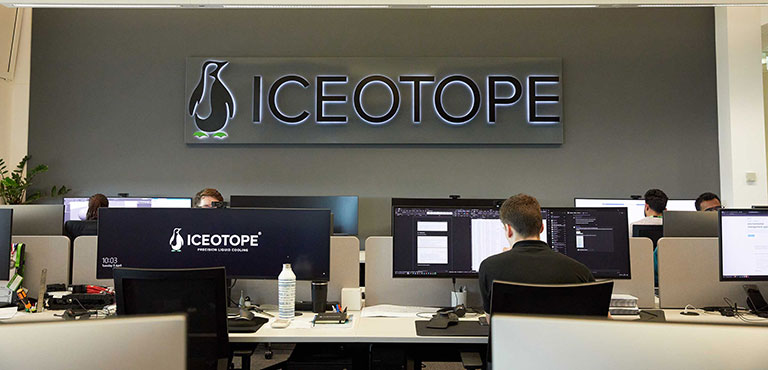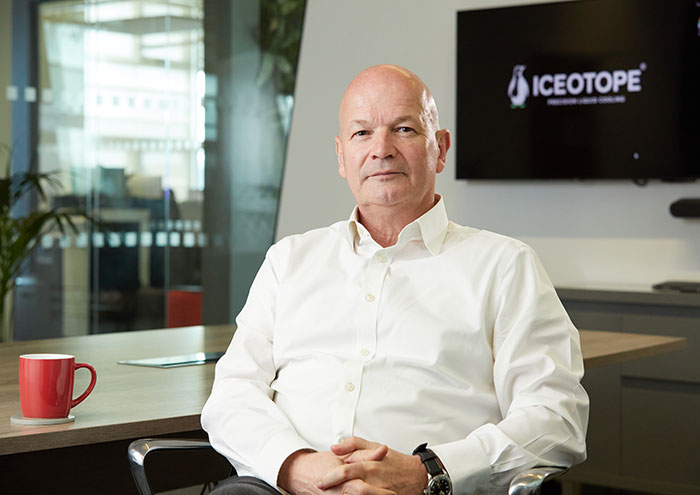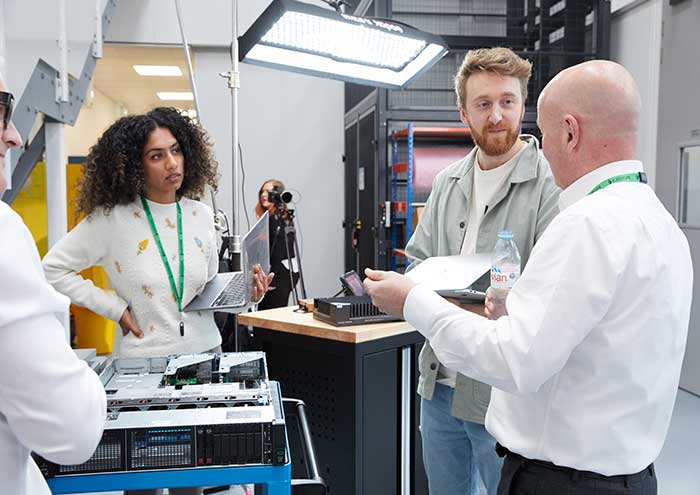- 4 mins
- Article

- Growing my Business
- Enable Growth
Iceotope: Crafting solutions for cooling the cloud
Iceotope is a cutting-edge tech firm taking a precision approach to cooling systems.

Created by WIRED Consulting in partnership with HSBC UK
We might think of the cloud as an immaterial realm, but it's a profoundly physical thing. Every time you upload a video, check your security camera, or send an email, activity happens in a data centre. These are the engine rooms of the digital age, powering everything from music streaming to remote working. The challenge is that data centres consume vast amounts of energy - around three percent of all electricity produced globally - not only to run the hardware but also to cool it. Iceotope’s advanced liquid cooling technology addresses this issue head-on, dramatically reducing energy use and helping create a more sustainable future.
That problem is only going to grow. Our data centre usage has long been on an upwards trajectory, but AI is causing that trend to spike. Forecasts estimate that AI will account for around 75 percent of data centre capacity by 2027 (Source: FT)—and global expenditure on data centres is expected to surpass $500bn (Source: Data Centre Dynamics) in the same timeframe. The grid may prove unable to keep up.
If data centres could be cooled more efficiently, it would help with their energy demands. The traditional cooling method is to blow air over components, but these fans-and-refrigerators systems are power-intensive, and air-cooling struggles to cope with the higher temperatures now being produced by the most advanced hardware. One alternative is to build data centres in cold environments, deep underground, or in Nordic countries, but space is limited and you can’t do this indefinitely.
That’s why there’s buzz around liquid cooling. Liquid is better at conducting heat than air but has its own trade-offs. Conventional systems either use ‘tank immersion’ which is space-inefficient, inflexible and requires additional infrastructure, or they use ‘direct-to-chip’ cooling, which channels fluid to individual components but doesn’t remove the need for air cooling entirely. What’s more, water is a precious resource.

Iceotope is a Sheffield-based tech business that wants to overcome these limitations. It combines the two approaches into a self-contained cooling module that encloses server electronics right there on the rack, and pumps coolant in a closed loop around the components to keep temperatures down.
“This allows us to use fractions of the electricity, to consume no water instead of billions of litres, and allows us to use probably about a sixth of the physical space,” says Craig, Iceotope’s CEO. The market has noticed. Iceotope has raised more than £53m in funding, counts household names in the global cloud and silicon industries as partners, and has seen revenues triple this year.
“Our mission very simply,” says Craig, “is to save the planet, one server at a time, and seek to make everything we touch better.
Net gains and chill
Iceotope’s technology is gaining traction. But, for Craig, growth is about more than just the P&L. “Particularly in a deep tech, scale-up business, you have to be able to find other milestones that recognise growth which are non-commercial,” he says. “For example, the kinds of talent that we're able to attract, or the investor base that we're able to attract.” One such milestone came recently: the company has shown it can cool the most demanding 1500W chips, setting a new standard for the industry.
It has been a long and winding road to get to this point. The business was founded in 2006 by the Sheffield University graduate Peter Hopton, but disagreement between board and investors saw the company go into administration in 2011. Hopton raised funds two months later to take control of the company, and a further VC round. Yet it struggled to break through as the management would have liked. “It had, it's fair to say, a tumultuous several years, where there was the kernel of a good idea, but the market was not ready to receive it,” says Craig. “But nonetheless, they were able to raise funding and bring people in.”
Explore how we can support your business's growth journey
From finding the right business account to talking to our corporate sector relationship team, we’re here to support you

Three key factors
Craig was one of those who were brought in, originally as a non-executive director, and in 2015 was asked to serve as chief executive. Under his tenure, it has grown from 18 to 80 across three geographies and revenue has increased 40-fold, a shift that has been driven by three key factors.
- The first was getting the basics in place. “I came in as a bit of a new broom,” says Craig. “The company was staffed with some good people, but people doing the wrong things, and not generating the kind of progress that investors, or indeed the customers, needed.” Iceotope needed to rethink its business model—as well as producing products itself, it now licences its IP to other manufacturers. “That actually allows us to get much more scale of what we sell and removes key barriers to entry for scale adopters.
- The second key factor was establishing a culture defined by clear values. “It's important to treat people right, and to do the right thing. So, we've often taken really difficult decisions - we've turned down valuable contracts that were either the wrong marketplace, the wrong companies, or had the wrong terms and we've had the courage to do those things,” says Craig. By doing this, they’ve found it easier to attract and retain high-quality talent.
- The third factor was having an international focus. America is a priority territory because many of the global cloud service providers have their headquarters in the US. They also do business across the Middle East, Asia and Europe. Craig’s advice for making that work? Ensure you’ve got the right banking partner.
Liquid assets
Iceotope banks with HSBC UK. “As we are expanding to these different jurisdictions and looking at how we grow and build the business, they want to be with us and support us,” says Iceotope’s CFO, Simon Jesenko. Not only does the bank’s international footprint help them handle the complexities of operating across multiple currencies and regulatory environments, but it’s able to offer a personal level of service. “I've only positive words to say about Lee Manterfield, our account manager. He's been very approachable, really responsive, he’s been open to different suggestions. And every time we talk, he's trying to figure out how best to help us in our journey,” says Jesenko. “I've worked with many high street banks in the past, and I've never had that level of engagement.”

Iceotope has especially valued the range of financial products on offer. In Jesenko’s experience, banks typically only offer more boutique facilities to larger companies. “The amount of services available to us—that I've never really thought that banks such as HSBC UK would be able to provide to a company in our position—is something that is fresh. And it's something that definitely businesses like ours need,” he says. “HSBC UK has really opened up their service offering to us, which I appreciate very much and I find very helpful.”
Craig says this partnership will be vital as Iceotope aims to scale further. The plan is to establish relationships with more of the world’s largest server manufacturers and cloud providers, wherever they are, and he believes the opportunity ahead is significant. “Liquid cooling in data centres is in its infancy. The rate and pace of adoption, particularly as AI rolls out, will go insanely exponential,” says Craig. “And increasingly organisations are moving to new territories, like Saudi Arabia, like Dubai, Kenya, and so on. So, all these areas, all these countries, will start to consume ever more as well.”
As the company goes on this journey, Craig will draw on what he has learned from scaling the business to where it is now. So, what are the most important things that experience has taught him—what tips would he want to share with other entrepreneurs? “I think sticking to your knitting really matters,” he says. “The strategy, the fundamental underpinning vision, [of Iceotope] has not changed one iota since day one.” His other crucial piece of advice is to focus unrelentingly on building and maintaining credibility with customers.
Together, those two principles can function as a guide to almost every decision. “Use that as a polestar,” he says. “And constantly seek towards that.”
Unlock global growth with trade, payments & FX solutions
Want help unlocking global growth? Find out how HSBC can support your international growth ambitions.



